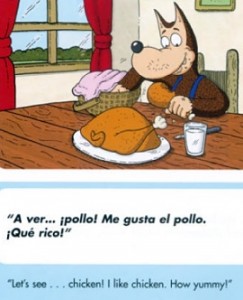There has been much talk over the past year about Apple’s revolutionary iPad and how it will change the way kids learn. Many schools have started introducing iPads into the classroom, most recently the New York Times reported on January 4, 2011 that Rosalyn High School, located on Long Island, provided 47 iPads to students and teachers, and at some point they would like to have iPads for all 1,100 students.
It’s a significant investment at an estimated $750 cost for each iPad, but the investment is expected to save money in the long run by cutting printing and textbook costs. The fact that the iPads are cool and the kids love to use them is just a bonus. The NYT article states that there are currently about 5,400 educational applications on the ipad.
Many other high schools and colleges across the country have started using the iPad in the classroom as well, but how about the little ones? Is the iPad an effective platform for young language learners? Well, it depends … it depends on the apps that are used.
The iPad absolutely can be a phenomenal platform for kids learning Spanish, French or Chinese in preschool if you have the right apps. The key is that the iPad apps for toddlers and preschoolers must meet the unique developmental needs and interests of this age group. The iPad itself will get their initial interest but it is the apps that will get them hooked. A textbook type approach won’t work – you will not be able to get a little kid to start conjugating verbs (you will lose them from the start, and this isn’t even an effective approach). On the other hand, a flashcard based approach with colors, days of the week, numbers, etc. is just not effective or particularly interesting.
Preschool language experts will tell you that one of the best ways to introduce kids to language is through storytelling. If done right, the kids are captivated while learning whole language in context. The kids hear words, phrases, and whole sentences in the dialogue (ideally with lively narration and vivid illustrations). For further reinforcement, the language can be supported with related games, crafts, songs, pretend play and other activities revolving around the story’s theme (e.g. The Three Little Pigs). Best of all, if the iPads and the story apps can travel home this will create an educational partnership with the parents – and this is when the language proficiency takes off.
As a firm believer in the iPad revolution and an advocate for early language learners, my company is proud to offer a 50% discount to educational institutions when purchasing multiple versions of my iPad apps. Current offerings include The Red Hen, Cinderella, The Three Little Pigs, Thumbelina, Jack and The Beanstalk, and The Ugly Duckling. All titles are bilingual Spanish/English, French/English and Mandarin/English.
******
Ana Lomba is changing the way people think about and interact with young children learning languages. Her Parents’ Choice award-winning books, lively songs, games, stories, and mobile applications are quickly becoming favorites with teachers and parents who want to nurture young children’ inborn language abilities. Key to the success of Ana’s break-through method is a focus on the family as the ideal environment for early language learning – even her signature curriculum for language programs is built with parents in mind. Ana has taught toddler, preschool, elementary school, and college-level Spanish courses, and held leadership positions with some of the most influential language organizations in the US, including ACTFL, NNELL and FLENJ. After graduating with a law degree from Spain, her native country, Ana pursued graduate studies at Binghamton University, Princeton University, and NYU.



